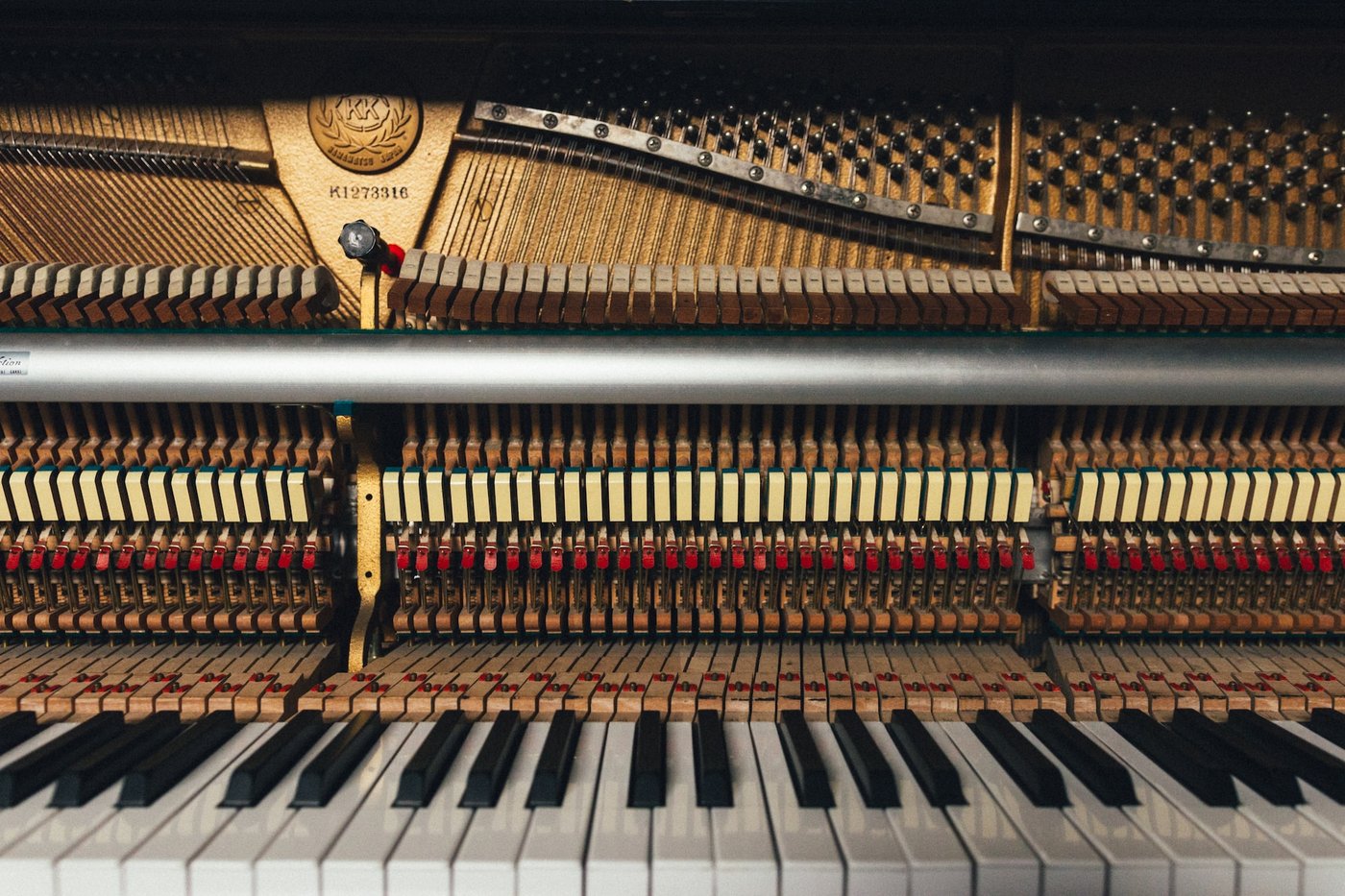
Ever considered becoming a piano tuner? In this lightly edited interview, we chat with professional piano technician Cameron O’Neill (O’Neill Piano) about the skills you need as a piano tuner, what the job is like, and how to take care of your own piano. Here’s how to become a piano tuner.
Table of Contents:
From gigging to teaching to fixing pianos, there are tons of stuff piano players can do if they love this instrument. Subscribe to The Note to keep up with our interview series, Piano Jobs You Can Get. Unsubscribe at any time.
More often than not, the terms “piano tuner” and “piano technician” are used interchangeably.
By definition, a piano technician is someone who services pianos, which can include tuning, regulating (adjusting the action and mechanical parts), and repair. It is entirely up to each technician which services they choose to offer; some specialize in repairing and rebuilding, while others mainly focus on tuning and regulating.
The vast majority of most piano technicians’ workload consists of tuning, as it is the most frequent kind of servicing a piano will need. It is recommended that one has their piano tuned 1-2 times a year.
I became interested in piano tuning many years ago while I was attending Grant MacEwan University. I would occasionally see the university’s piano technician working on the pianos, and I always got this sense of mystery whenever he appeared. It was like he was employing some kind of secret mystical knowledge to make the pianos sing beautifully.
A few years after I graduated, I was living at a house with some roommates, one of whom had a small upright in the living room. This piano had drifted quite far out of tune but he was too broke at the time to hire a tuner, so I took it upon myself to try and tune the piano myself. Despite lacking the proper tools and any prior knowledge of how to actually tune a piano, the results weren’t too bad! Following this, I invested in some tools and a few books, dedicated more time to learning and practicing, and not long thereafter I started getting calls from musician friends who had pianos that needed tuning.

I am an entirely self-taught pianist, with no classical training whatsoever. I do play several other instruments, including guitar, bass, and drums. While attempting to establish a career as a full-time musician, I had never really considered a career as a piano tech. I would say that a certain kind of divine intervention has ultimately led me to this career path, and I am forever grateful for it.
The first step is to get your hands on a piano. This is the easy step. Everywhere you look, people are giving pianos away for free, as they’re large, difficult to move, and usually not worth much as they get older.
Once you have a piano that you can regularly work on, the next step is ear-training. Tuning pianos is an aural practice, even if one uses an electronic tuning device to assist them. In order to become a piano tuner, one needs to train their ears to be able to hear very small differences in pitch. There are many resources, both online and in books, that teach the proper methods and practices for learning the art of piano tuning.
The first step is to get your hands on a piano . . . The next step is ear-training. Tuning pianos is an aural practice, even if one uses an electronic tuning device to assist them.
Cameron O’Neill
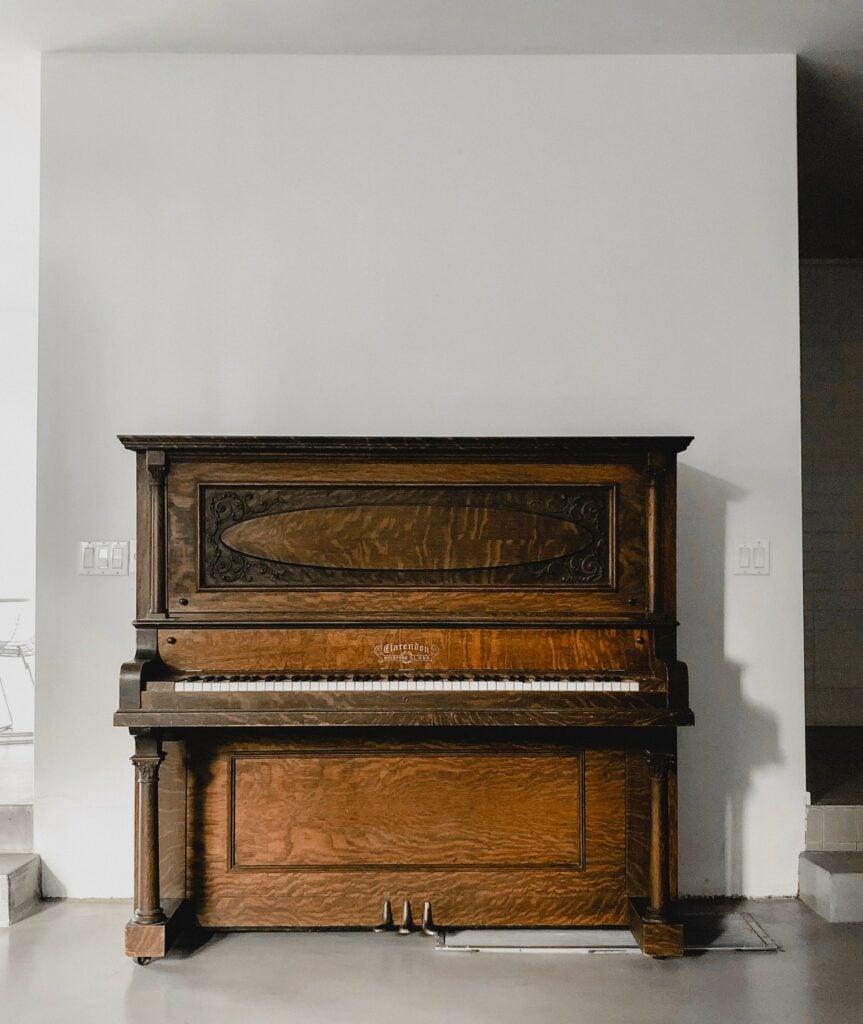
A good course of action is to seek out other local technicians and see if anyone is willing to take you on as an apprentice. For the first three years of my practice, I was learning entirely on my own with no mentorship from anyone, to which there are pros and cons. While it gave me the opportunity to learn everything hands-on, there are a million little tips, tricks, and quirks in the art of piano service that only an experienced technician can teach you.
Around the world, there are numerous associations and education opportunities for piano technicians. In the US, the Piano Technician’s Guild is the main association for both professional and aspiring technicians. They offer many educational opportunities, as well as the Registered Piano Technician certification. In Canada, where I live, we have the Canadian Association of Piano Technicians, which operates much in the same way as the PTG.
There are various locations throughout the US and Europe that offer educational courses in the various fields of piano technology. Of course, in our modern age, there is also an endless well of resources online, in the form of videos, blogs, and forums. Frankly, it has never been easier to become a piano technician!
The question on everyone’s mind! The answer, of course, is not entirely straightforward. It largely depends on where you are located, how much experience you have, and the general demand for piano services.
In a big city, such as New York or Toronto, one might find that there is more competition as a denser population likely means that there are more working piano technicians in your area. If you live in a smaller town, there’s a good chance that there are little to no piano technicians near you. However, there may also be fewer pianos out there needing a tune-up as a result. These are all factors that affect how much work you will be able to find.
3 pianos/day at $100/tuning
5 days a week
50 working weeks
= $75k/year
The good news is this: there aren’t many piano technicians out there. And the number of young folks learning this trade doesn’t seem to be too high. So there’s a pretty good chance that if you take the time and effort to learn the art of tuning pianos, you can find a steady amount of work out there!
The average technician will likely charge anywhere from $100 – $200 (US dollars) per standard tuning. Regulating and repairs will incur their own costs, which sometimes are flat rates and sometimes are charged hourly. Bearing all this in mind, a busy piano technician tuning 3 pianos a day, 5 days a week, can make anywhere from $70,000 – $100,000 a year! Don’t forget to put aside some of that for tax season.
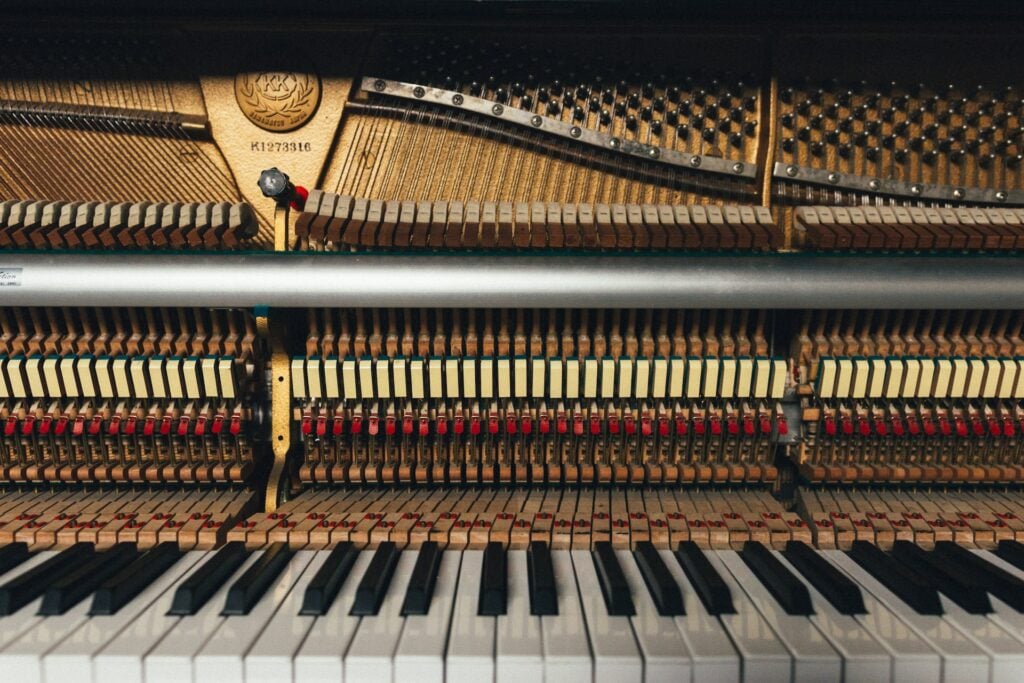
The most important thing one needs to be a good piano tuner is a good ear. The question that drives every piano tuning is simple: “Does it sound good?” Sometimes the path to making a piano sound good involves going against what seems logical or disregarding what an electronic device tells you is “correct”. There are many weird intricacies to the way we tune pianos, and to a greater extent the way we tune all instruments, and more often than not the most sophisticated tool we have at our disposal is the human ear.
Having “perfect pitch” (or “absolute pitch”)—the ability to identify musical notes without any external reference—is entirely unnecessary. In fact, I would venture to say that it would likely be somewhat of a hindrance, as the work of a piano technician often involves them delving into pitches and frequencies that don’t fit perfectly into a perfectly-tuned chromatic scale.
The question that drives every piano tuning is simple: “Does it sound good?” Sometimes the path to making a piano sound good involves going against what seems logical or disregarding what an electronic device tells you is “correct”.
Cameron O’Neill
As far as personality is concerned, patience is of the utmost importance. Tuning pianos can be tedious at the best of times, and at the worst of times downright soul-crushing. There are over 200 individual strings in a piano, and all of them need to be adjusted to an extremely precise position in order to achieve an in-tune piano. Often the strings and tuning pins don’t behave the way you want them to. It takes a certain kind of quiet dedication to work with such a temperamental instrument.
One doesn’t need to be a professional pianist in order to become a piano technician. I can speak from experience! Nevertheless, a certain amount of basic playing ability goes a long way, particularly when it comes to checking the accuracy of your tuning. A few scales, some chord progressions, an understanding of how chords and melodies are often voiced. These are useful things to know, especially when the pianist you have tuned for sits down and inspects your work!
There are over 200 individual strings in a piano, and all of them need to be adjusted to an extremely precise position in order to achieve an in-tune piano.
Cameron O’Neill

Vastly different! A piano has so many different parts, from the strings to the action to the cast-iron plate to the wood itself. Every piano you encounter will be an entirely unique instrument, with its own quirks and secrets. Some may make your job very easy. Some may fight and struggle to the bitter end.
Grand pianos are often said to be superior to upright pianos. This mostly has to do with the length of the strings and the way that the action functions. However, this does not mean that a grand piano will always sound better than an upright. I’ve played grands that sound rather tinny and grating, and uprights that sound deep and rich. It all depends on the length of the strings, the quality of the hammers, the way the instrument was built, and the general upkeep of the piano itself.
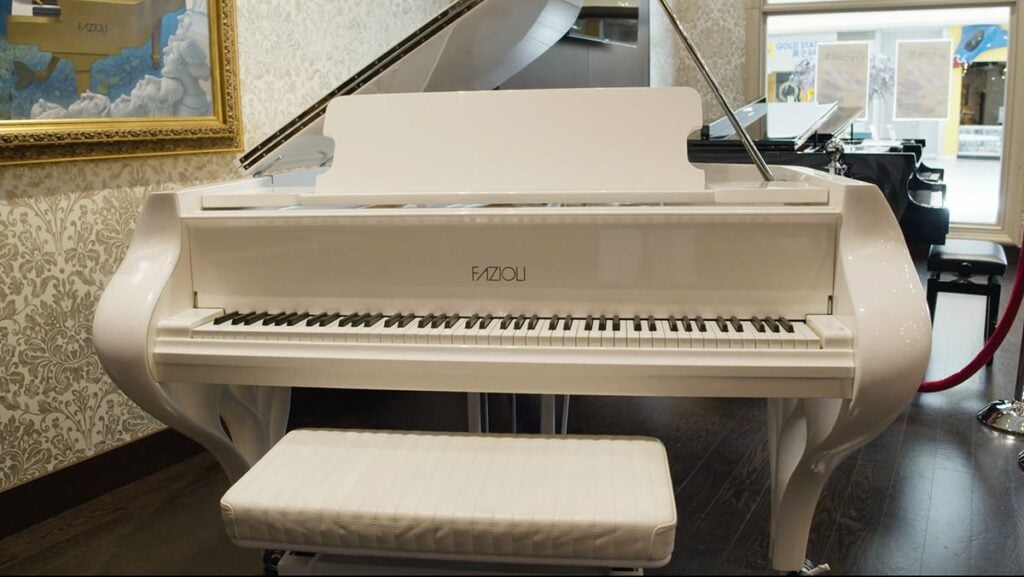
As far as newly-made pianos are concerned, you pay for quality. There are $1000 entry-level pianos that function well enough for any household, but are mass-produced with significantly less time and care put into the fine details. Similarly, there are $50,000 pianos meant for the most prestigious of concert halls and studios, and if one looks closely one can see how those prices reflect in the way in which the pianos function.
All this being said, determining whether a piano is “good” or “bad” is not a simple science. I have a huge soft spot in my heart for vintage pianos. A testament to the quality of 20th-century piano manufacturing is how many 50-100+ year-old pianos there are in the world today. Now, some are in immaculate condition, while the vast majority are slowly decomposing from years of wear with little upkeep. But when it comes to deciding which piano is the right one for you, one has to take into account many different factors.
For anyone looking to acquire an acoustic piano, the most important things to consider are:
A piano, much like any other musical instrument, should be treated with care and respect. I often think about them in the same terms as cars. If you drive a car every day and never change the oil, it will eventually break down on you. If you leave a car parked on the street for several years, it might not start up again. But if you drive your car frequently, keep up with the maintenance, and treat it with love and respect, it will reward you with years and years of reliability.
Pianos are almost exactly the same. Ensuring that they are regularly tuned and maintained will guarantee you a well-functioning, beautiful-sounding instrument. They will collect dust and debris over time, and this can affect how the piano plays, so it’s recommended that your piano technician also does a little cleaning when they come around to tune your piano.
Drinks on the piano are dangerous. They can be knocked over and spill into the interior of the instrument, potentially gumming up the action and keys with sticky gunk. At the very least, put a coaster down to prevent rings in the veneer!
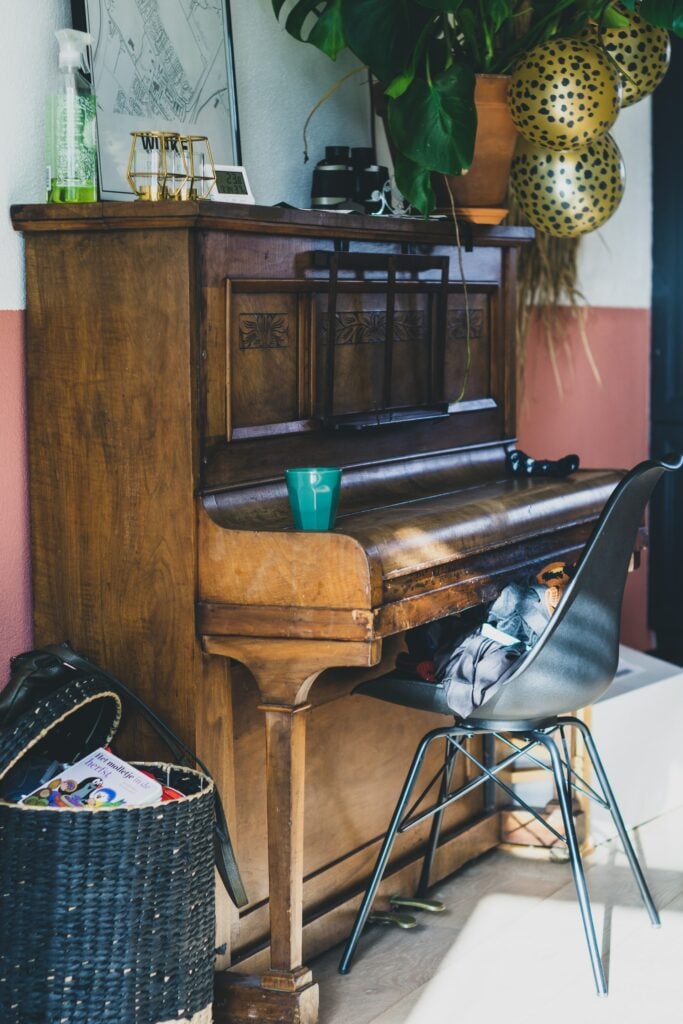
Pianos in different climates are affected by different afflictions. Where I live, in Alberta, the climate is very dry and the temperature shifts massively between winter (down to -40° F) and summer (up to 90° F). This can greatly affect the tuning of a piano, and often I find pianos go out of tune in conjunction with the change in seasons. Where the climate is more humid, a piano tech may encounter other problems, such as mold growth within old piano actions.
Regardless of where you are located, the rule of thumb is to get your piano tuned at least once a year. If you’re really keen, twice a year is perfect!
After you’ve spent a couple of hours completely focused, adjusting every string, every little frequency to exactly where it should be, and you finish tuning the final note…just playing a little music on that freshly-tuned piano, that’s bliss.
In order to make a piano “in-tune”, you actually have to make it “out-of-tune”. This is the result of two different quirky concepts: temperament and inharmonicity.
Temperament, in simple terms, is a result of the concept that tuning notes “perfectly” actually makes it so that you cannot play in multiple keys. There is some weird math that makes this the case, and if you’re feeling really nerdy I recommend watching some Youtube videos about it. So if one wants to play in all 12 major and minor keys, we can tune octaves perfectly, but every other interval must be slightly imperfect.
Inharmonicity is when piano strings behave less like strings and more like solid bars. This means that when they vibrate, they produce overtones that differ from what the overtones theoretically should be. As a result, when tuning pianos, we almost always stretch the bass notes a little bit flatter and the treble notes a little bit sharper.
Thanks, Cameron, for teaching us about piano tuning! To catch up with Cameron:
Website: O’Neill Piano
Instagram: @oneill.piano
More about pianos:
The best way to learn piano is with real teachers, but not everyone has the time and money for a private instructor. At Pianote, you can get real feedback from real experts…all from the comfort of your own home. Explore our Method and community yourself with a free 7-day trial.
TRY PIANOTE FOR 7 DAYSCharmaine Li is a Vancouver writer who has played piano for over 20 years. She holds an Associate diploma (ARCT) from the Royal Conservatory of Music and loves writing about the ways in which music—and music learning—affects the human experience. Charmaine manages The Note. Learn more about Charmaine here.
/marketing/pianote/lead-gen/getting-started/coach.webp)
/marketing/pianote/lead-gen/getting-started/logo.webp)
By signing up you’ll also receive our ongoing free lessons and special offers. Don’t worry, we value your privacy and you can unsubscribe at any time.
We use cookies for traffic data and advertising. Cookie Policy »